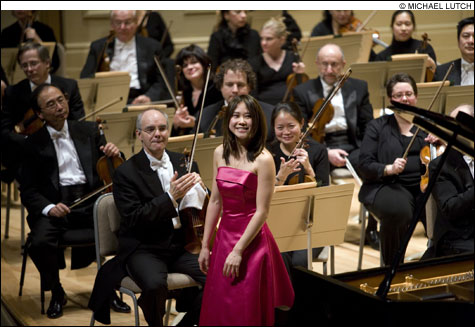
SHE DESERVED THE CHEERS: Yuja Wang substituted on short notice for Martha Argerich. |
It’s been eight years since Ricardo Chailly made his last Boston appearance. Along with Simon Rattle, he’s probably the most exciting conductor of the middle generation between Claudio Abbado, say, and Robert Spano. I was not particularly looking forward to the program he chose for his Bank of America Celebrity Series concert with the Leipzig Gewandhaus Orchestra: two Richard Strauss tone poems and a Franz Liszt piano concerto, with young Chinese virtuoso Yundi Li. The number of empty seats at Symphony Hall suggested that other concertgoers may have felt the same way. Yet between Chailly’s conducting and the youthful orchestra’s brilliant playing, I’ve enjoyed few orchestral concerts this season more.
Chailly has two qualities that are the sine qua non of great conductors: rhythm and character. He seems incapable of allowing a dull or empty phrase to emerge from the ensemble. He actually plays phrases rather than notes, and each phrase has a kind of rhythmic snap that keeps listeners on their toes. Strauss’s Don Juan virtually exploded, and then the great oboe solo, depicting the Don Juan’s ideal love (or his longing for it), spun out like a beautiful aria, vocal silk. Even the usually bloated Ein Heldenleben (“A Hero’s Life” — Strauss’s not exactly modest self-portrait) had an irresistible forward rush, partly the result of Leipzig’s lean string sound and partly created by Chailly’s decision to aerate the orchestral texture by placing (as does BSO music director James Levine) the first and second violins on opposite sides of the stage. The basses practically hanging over the edge of the stage gave a thrilling buzz to the bottom-feeding lower depths.
Ein Heldenleben is full of characters: Strauss himself, of course, and his complicated wife (beautifully realized in the concertmaster Frank-Michael Erben’s long solo), and the hero’s major adversaries, the whiny critics. Chailly caught both the passion and the satire.
In between came the mother of all virtuoso piano concertos, Liszt’s First. (Although it was the Second that the Celebrity Series had announced.) Yundi Li played this with exuberant pyrotechnics and visceral power but also with considerable elegance, never cheapening the bravura score. He’s the real Lang Lang.
The audience cheered both conductor and players, and so we were rewarded with a delicious encore: “The Dance of the Seven Veils” from Strauss’s Salome, dripping with insinuation and demented lasciviousness. You didn’t need an actual dancer to see those veils dropping. Would that performances of this music in actual opera productions were as dazzling, as compelling, or as much fun.
Teatro Lirico d’Europa, the touring opera company from Bulgaria, was back at the Cutler Majestic for three operas — La bohème, Carmen, Madama Butterfly — and a “gala.” I missed Bohème, and though Carmen has flimsy sets and company director Giorgio Lalov’s staging doesn’t venture far beyond Gypsy clichés, and in the title role Russian mezzo Galia Ibragimova sang unschooled French, Brahms’s favorite opera (no kidding!) remains one of this irresistible company’s most consistently enjoyable productions. Lalov at least focuses on the essentials: Carmen’s free-spirited sexuality and Don José’s stiff conventionality. Ibragimova rarely removed her hands from her swinging hips or behind (except, once, to grab an officer’s crotch), but she has a big, clear voice, a great smile, and she can really move. Tenor Adam Klein, who sings featured roles at the Met, hasn’t changed much since he sang in Benjamin Zander’s Mahler Eighth Symphony with the Boston Philharmonic in 1999; he’s an intelligent artist, yet he pushes his sizable but sandpapery voice into tonelessness. Still, he was passionate and pathetic. Slim and slim-toned baritone James Bobick, from the New York City Opera and countless regional companies, had neither the vocal heft nor the charisma to be more than an adequate Toreador. Adina Aaron was a touchingly naïve Micaëla, though her big aria stretched her voice out of alignment and conductor Krassimir Topolov’s arrhythmia didn’t help. (He had enough trouble just keeping the orchestra together — Bizet’s inspired interludes were an embarrassment.)